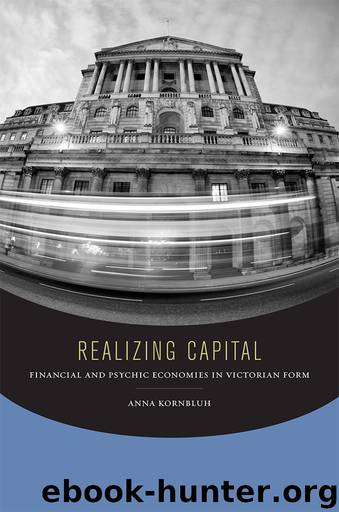Realizing Capital by Kornbluh Anna

Author:Kornbluh, Anna [Kornbluh, Anna]
Language: eng
Format: epub
Publisher: Fordham University Press
Published: 2013-03-14T16:00:00+00:00
5. London, Nineteenth Century, Capital of Realism
On Marx’s Victorian Novel
Of course we have all read, and all do read, Capital. . . . But some day it is essential to read Capital to the letter, to read the text itself.
—Althusser and Balibar, Reading Capital
Marx has not yet been received. The subtitle of this address could thus have been: “Marx, das Unheimliche.” Marx remains an immigrant chez nous, a glorious, sacred, accursed, but still a clandestine immigrant, as he was all his life. He belongs to a time of disjunction, to that “time out of joint” in which he is inaugurated, laboriously, painfully, tragically, a new thinking of borders, a new experience of the house, the home, and the economy. Between earth and sky. One should not rush to make of the clandestine immigrant an illegal alien or, what always risks coming down to the same thing, to domesticate him. To neutralize him through naturalization. To assimilate him so as to stop frightening oneself with him. He is not part of the family, but one should not send him back, once again, him too, to the border.
—Derrida, Specters of Marx
Marx is not part of the family, but one should not send him back. There is of late no more popular way to trivialize and exoticize Karl Marx than to dismiss his insuperable masterpiece of critical political economy as “a Victorian melodrama or a gothic novel . . . a picaresque odyssey through the realms of higher nonsense . . . a shaggy-dog story.”1 The intent of such claims is clearly to send him back, to bury Marx definitively in the nineteenth century, shrouded in a contempt as great for Victorian novels as for his own achievements. In Chapter 1 I argued that Marx’s Victorianism is nothing to laugh at: he found the powerful idea of “fictitious capital” circulating in the press that he avidly consumed. In this chapter, as I discuss other linkages between Marx and the Victorian intellectual context, I will suggest that, far from composing Marx’s eulogy, the analogy between his work and that of the Victorian realists may be the condition of his immortality. Capital may be, as one sneering biographer avers, “best understood as a Victorian novel,” but in that case a different register of its meaning-making must open up from reading it that way; reading Marx’s novel must enrich rather than impoverish our understanding of the Marxian edifice.
Two inversions propel this chapter. I have been arguing that Victorian literary realism can levy an incisive critique of financial metalepsis. I will now argue, through the looking glass, that an incisive critique of financial metalepsis may work as Victorian literary realism. Moreover, I have been exploring the troubling capacity of the construct of psychic economy to displace the structural understanding of capital’s ungroundedness. I will now argue, on the other side, that Marx’s structural understanding of capital’s ungroundedness substantiates an alternative construct of psychic economy, one focused on the “drive” (Trieb) of the capitalist system. Where, for the
Download
This site does not store any files on its server. We only index and link to content provided by other sites. Please contact the content providers to delete copyright contents if any and email us, we'll remove relevant links or contents immediately.
| Ancient & Classical | Arthurian Romance |
| Beat Generation | Feminist |
| Gothic & Romantic | LGBT |
| Medieval | Modern |
| Modernism | Postmodernism |
| Renaissance | Shakespeare |
| Surrealism | Victorian |
4 3 2 1: A Novel by Paul Auster(11032)
The handmaid's tale by Margaret Atwood(6836)
Giovanni's Room by James Baldwin(5870)
Big Magic: Creative Living Beyond Fear by Elizabeth Gilbert(4717)
Asking the Right Questions: A Guide to Critical Thinking by M. Neil Browne & Stuart M. Keeley(4564)
On Writing A Memoir of the Craft by Stephen King(4205)
Ego Is the Enemy by Ryan Holiday(3982)
Ken Follett - World without end by Ken Follett(3968)
The Body: A Guide for Occupants by Bill Bryson(3789)
Bluets by Maggie Nelson(3705)
Adulting by Kelly Williams Brown(3663)
Guilty Pleasures by Laurell K Hamilton(3578)
Eat That Frog! by Brian Tracy(3505)
White Noise - A Novel by Don DeLillo(3429)
The Poetry of Pablo Neruda by Pablo Neruda(3358)
Alive: The Story of the Andes Survivors by Piers Paul Read(3302)
The Bookshop by Penelope Fitzgerald(3220)
The Book of Joy by Dalai Lama(3212)
Fingerprints of the Gods by Graham Hancock(3206)
